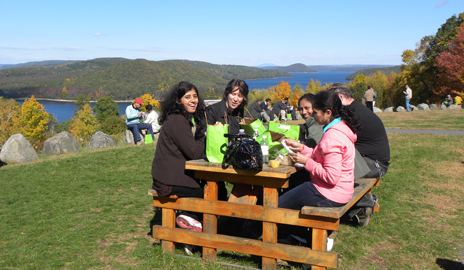Officers of the Indian Forest Service (IFS) arrived on the Yale campus July 21 for a two-week training session on state-of-the-art concepts and practices in forestry and environmental management. The session is part of a partnership between the Global Institute of Sustainable Forestry at Yale, TERI University (The Energy and Resources Institute in India), and the Indira Gandhi National Forest Academy acting under the auspices of the Indian Ministry of Environment and Forests.
The Indian Ministry of Environment and Forests conceived the idea of holding short, intensive training sessions as a way of injecting fresh ideas, tools, and techniques into its forest service. The Yale Global Institute has participated from the beginning of the program, making this the fourth year, and the sixth group of Indian foresters welcomed to campus.

The intensive program for Indian foresters is now in its fourth year at Yale. Image credit: Yale University
The Yale School of Forestry and Environmental Studies and TERI have a long-standing relationship, with ongoing exchanges of students and postgraduates, but this training program is one of the most intensive partnerships. According to Mary Tyrrell, executive director of the Yale Global Institute of Sustainable Forestry, which planned and hosts the two-week session, the institute is “delighted to be partnering with TERI in this tremendous investment the Indian government is making in their Forest Service officers, to enhance the IFS’s ability to meet the challenges of managing India’s forests for the future.” The two-week module is intended to give participants the opportunity to learn from the experience of a country other than their own and expose them to the global context of the science and practice of forest policy and management.
While on campus, the foresters listen to and take part in lectures and workshops from world leaders in the science of forestry, such as Chadwick Dearing Oliver, the Pinchot Professor of Forestry & Environmental Studies and the director of the Global Institute of Sustainable Forestry. Oliver is best known for his work on how forests develop and how that knowledge can be usefully applied to resolve issues at the landscape and policy levels. He has also developed his own “short course” — the Executive Education in Forestry Program — an intensive five-day class for those at high levels of management who need a greater knowledge of managing the environment than that for which they have had training.
Topics will range from the local to the global. Participants will hear from Oliver about managing forest resources globally, and will also discuss the managment of local, urban forests with Colleen Murphy-Dunning, the director of Yale’s Urban Resources Initiative (URI). URI is responsible, at the behest of local communities, for many of the small “pocket parks” as well as street trees around New Haven. Murphy-Dunning will talk about the effect these projects have on impoverished communities to make a commitment to caring for their own neighborhood parks.
After their time on campus the group will go on a field tour of some of the major forest highlights of New England, with lectures along the way. They will visit the Yale-Myers Forest, which Yale owns and uses as both a sustainably managed working forest and a research site for students. There they will meet with Professor Mark Ashton, the Morris K. Jesup Professor of Silviculture and Forest Ecology, director of the School Forests, and a preeminent silviculturalist and ecologist, especially in forest regeneration. They will also meet with the state forester of Connecticut, Chris Martin; have the opportunity to talk with private landowners in the “Quiet Corner” area of Connecticut; and tour Hull Forest Products, a Connecticut-based multi-generational sawmill and woodland management company that is recognized for its conservation values and practices.
In addition, the Indian foresters will meet with Paul Barten, a professor at the University of Massachusetts at Amherst in the Department of Environmental Conservation, who studies forested watersheds.They will visit the Quabbin Reservoir and surrounding watershed, which supplies drinking water to the greater Boston area. Unlike most urban areas that use waste treatment plants for water, the Boston area uses forests as a filtration system. The idea that the government is required to provide safe water from every tap, note the Yale hosts of the group, is a powerful one to people coming from a country where safe drinking water is by no means guaranteed.
At the end of their stay, the Indian foresters will spend two days at the 800,000-acre White Mountain National Forest in New Hampshire with forest supervisor Tom Wagner as a guide. He also will lecture on the subject of “Managing Public Land for Multiple Uses” and on the history and function of the U.S. Forest Service.
“During the classroom sessions and field visits, the opportunity to share information, ideas, and programs is a learning experience for us as well as the Indian officers,” notes Tyrrell.
– By Barbara Ruth
*Source: Yale University
